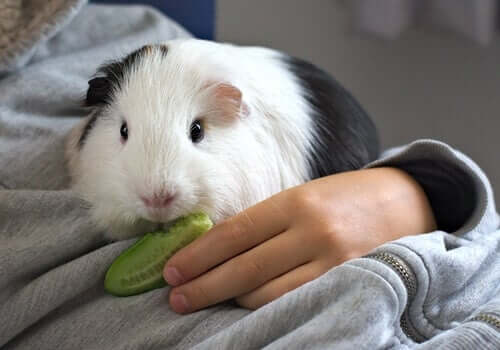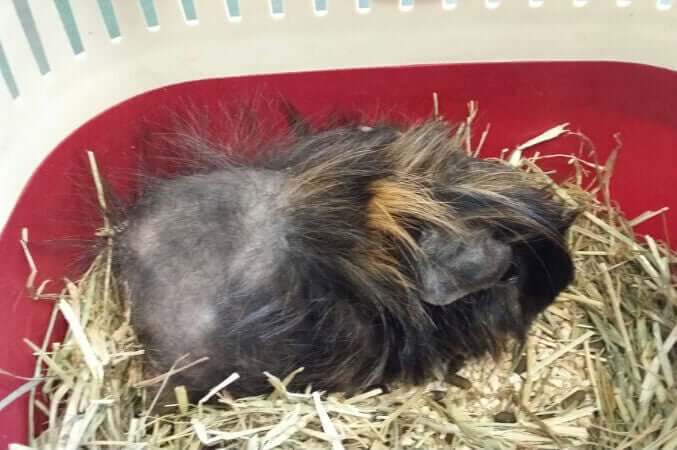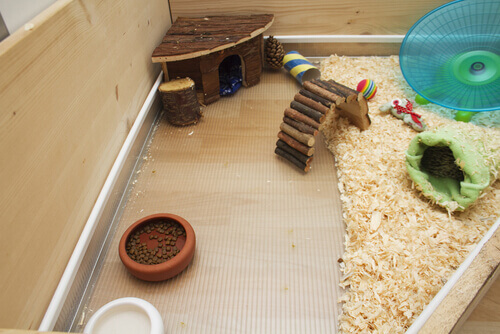Stress in Guinea Pigs: All You Need to Know

Guinea pigs are animals that don’t tend to need to visit veterinary clinics very often unless they have a clear health problem. However, they still may require certain attention at different points in their lives. In this sense, stress in guinea pigs can be one reason you may need to take your pet in for a consultation.
Along with rodents, guinea pigs are the most popular rodents when it comes to pets. At first glance, these animals don’t seem to have a lot of worries. However, that isn’t always necessarily true. Today we’ll take a closer look.
Do guinea pigs experience stress?
Rodents are actually very sensitive to stress. In order to understand this, we need to remember that, in their natural state, these animals are easy targets for a number of predators. Therefore, stress plays a crucial role in their survival.
Even when they live as domestic pets, free from the threat of predators, guinea pigs have very delicate health. Therefore, in order to remain healthy and happy, guinea pigs require attention in various aspects of their lives. These include nourishment, hydration, exercise, parasite prevention, etc.
When pet owners don’t attend to these areas, stress in guinea pigs may ensue, producing health problems. For example, animals may experience hair loss, or stress may cause illnesses an animal already has to worsen.
Some symptoms of stress in guinea pigs are:
- Irritability or aggression. Guinea pigs are not generally prone to becoming aggressive. Therefore, if you notice aggression in your pet, take it as a sign that something is awry.
- Excessive grooming. Guinea pigs, like other rodents, bathe themselves on a daily basis using their tongues and feet.
- Digestive problems.
- Diarrhea. This can be a symptom of stress, or may become worse as a result of the same situation.
- Problems with the animal’s fur or skin. Alopecia can be a characteristic symptom of stress in guinea pigs and requires the attention of a veterinarian.

Tips for reducing stress in guinea pigs
Stress directly affects the delicate health of guinea pigs. Therefore, the best way to prevent health problems is to reduce stress and offer your pet a happy and healthy life .
1. Guinea pigs are social animals
Guinea pigs are gregarious animals. In nature, they live in colonies. Therefore, it’s best to have more than one in your home.
Since they are social animals, having companionship reduces their stress levels greatly. However, that’s not always possible. So, if you have just one guinea pig, make sure you give it the attention it requires.
Guinea pigs are also sociable with human beings, although they may be somewhat fearful of people they don’t know.
Building a relationship with your guinea pig takes time and patience. New owners need to respect their rodent’s space until it gets used to your presence. Once the animal allows you to pick it up, you need to be gentle and calm and avoid any abrupt movements .
2. Offer proper nutrition
Guinea pigs are herbivores and their diet must consist of dry good, vegetables, fruit, and hay. What’s more, it’s important for owners to be aware that they don’t synthesize vitamin C. Therefore, you need to add it as a supplement to their diet or through foods that have a high vitamin C content. For example, kiwis, strawberries, citrus fruits, peppers, or spinach.
3. Enrich their environment
These rodents need to exercise and stay active in order to prevent obesity. In order to help them, you can take them out of their cage and let them run around freely–always under supervision. At the same time, there are all kinds of objects and accessories that you can add to their habitat in order to provide enrichment.
4. Keep their cage clean
Keeping your guinea pig’s cage clean, with food and fresh, clean water, is fundamental. This means cleaning the cage on a weekly basis. In order to do so, use a disinfectant that doesn’t irritate the animal’s skin or mucus membrane and remove leftover food and dirty bedding. You should also apply a product that works against parasites like mites, fleas, and lice.
- Stress weakens the immune systems and leaves the animal’s body more vulnerable to parasitic infections.
- The itchiness that illnesses like scabies (mange) cause produces a great deal of stress in guinea pigs.

Guinea pigs, a therapeutic companion against stress
Animal therapy is more and more common these days. You’ve probably heard of dogs, cats, and horses providing therapy , but did you know that guinea pigs are also excellent therapeutic companions?
Guinea pigs are very beneficial in therapy with children with autism spectrum disorder (ASD). They help reduce the stress these children may experience when in contact with other individuals. And, therefore, they make it easier for children with ASD to concentrate on tasks that require them to interact with others. In fact, therapy with guinea pigs can even help children initiate contact with other people.
The calming effect of guinea pigs can be combined with other types of therapy in order to facilitate the socialization of these children and make it easier for them to adapt to society.

All cited sources were thoroughly reviewed by our team to ensure their quality, reliability, currency, and validity. The bibliography of this article was considered reliable and of academic or scientific accuracy.
- Zotal laboratorios. Cobayas, enfermedades más comunes y cuidados, 2019.
- Psicología y Mente. Las cobayas tienen un efecto positivo en los jóvenes con Autismo.
- Centro veterinaro Barbanza. Enfermedades más frecuentes en cobayas y cómo prevenirlas, 2016.